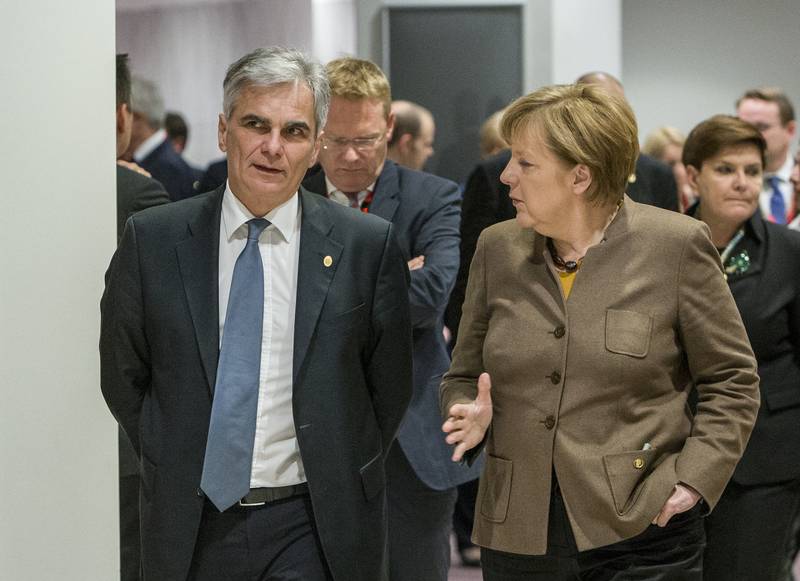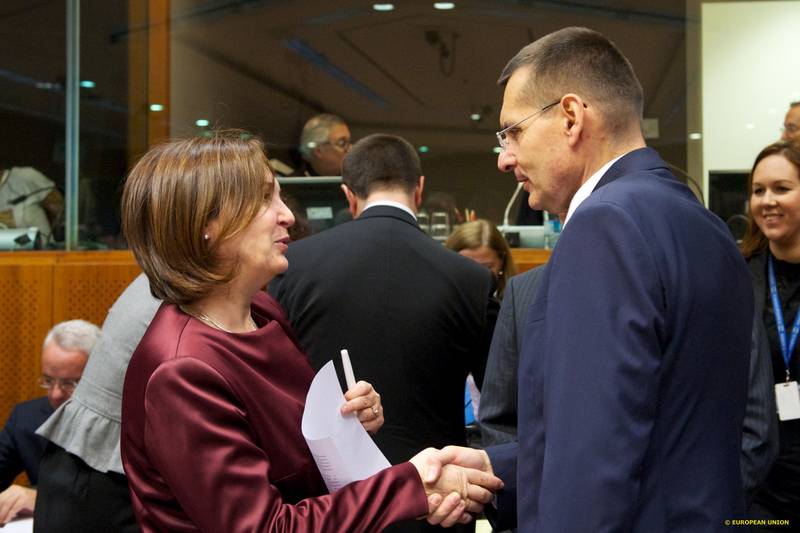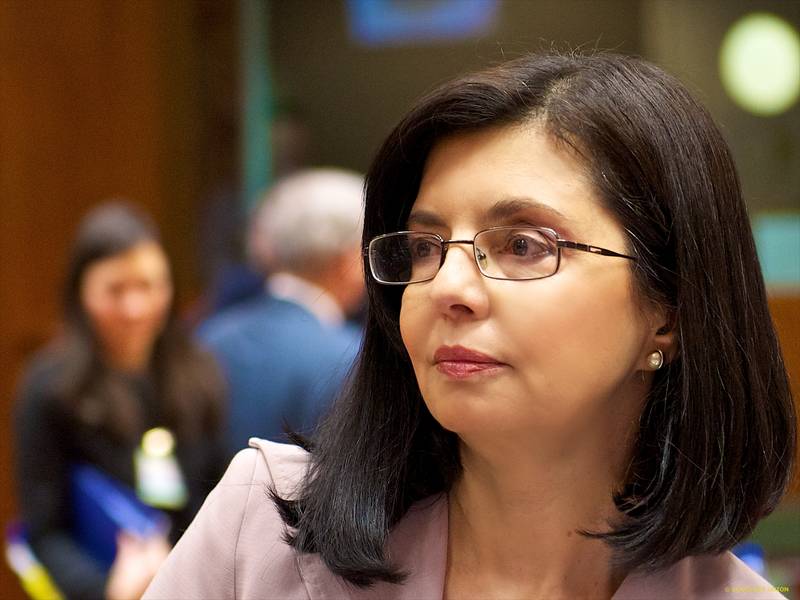Romania: Schengen is Partnership between Equal Partners
Adelina Marini, September 24, 2011
 Why to accept us in Schengen since we behave as if we are still not members of the EU? This is what I thought the other day when I understood that Minister Tsvetanov (Tsvetan Tsvetanov, Minister of the Interior of Bulgaria) talked before Bulgarian media somewhere, again not in the specially designated briefing room of Bulgaria, which is situated in the building of the European Council in Brussels where all member states have briefing rooms. Some have bigger rooms, like France, Germany and Britain, for instance, but the smaller ones are also very comfortable. The practise not to use the Bulgarian briefing room has been introduced by the government of Boyko Borissov whom we, the journalists at European Councils, often wait for in the corridors, in cold currents and in full unawareness when he would deign to come down to the people and tell them what he had agreed for on their behalf.
Why to accept us in Schengen since we behave as if we are still not members of the EU? This is what I thought the other day when I understood that Minister Tsvetanov (Tsvetan Tsvetanov, Minister of the Interior of Bulgaria) talked before Bulgarian media somewhere, again not in the specially designated briefing room of Bulgaria, which is situated in the building of the European Council in Brussels where all member states have briefing rooms. Some have bigger rooms, like France, Germany and Britain, for instance, but the smaller ones are also very comfortable. The practise not to use the Bulgarian briefing room has been introduced by the government of Boyko Borissov whom we, the journalists at European Councils, often wait for in the corridors, in cold currents and in full unawareness when he would deign to come down to the people and tell them what he had agreed for on their behalf.
This behaviour sharply enhances the feeling that as if Bulgaria has never been invited to join the EU and this is why she slips in unnoticed in the crowd, hoping no one from the guards will point at her and ask for her invitation. The briefing room is not just convenient for the journalists who can sit, use the internet and therefore continue doing their job while waiting (because during Councils usually we have to wait a lot, there is never a precise hour a meeting to end, especially when there controversies). Another advantage of the national briefing room is that a full video footage is being made and then the briefing can be watched on the Council's website. So, not only one can understand the position of a member state without attending its national briefing but even without being physically in Brussels. Often interpretation is offered, but not always.
And why would a member state want its position to be seen by others, not only by the national journalists?
Because in the EU decisions are being taken by all the 27 member states and it is good each one of them to know as much as possible about the others. Thus it is easier for them to motivate their decisions. And, after all, this is about accountancy - before the Bulgarian and European taxpayers.
You remember, probably, that since we started the accession processes to the EU we have always been in a package with Romania. At the beginning we were protesting that the Romanians were slowing us down with their zero progress but then they started to murmur that we were lagging behind. It is obvious, though, that in some simple things the Romanians know how to do things. I started a little bit from far away just to tell you that Romania had a position it defended during the ill-fated Judicial and Home Affairs (JHA) Council in Brussels on September 22. And this position, expressed by Minister of the Interior Traian Igas during the session is uploaded with translation in English on the website of the Romanian home affairs ministry.
Don't get me wrong - it's not that the Bulgarian interior ministry does not have an English section of its website. It has but even in the Bulgarian section there is no statement (if there was ever) of Minister Tsvetan Tsvetanov with which he was supposed (at least this is what I think) to convince his EU colleagues, especially those from the Netherlands and Finland, that they have to support us for joining Schengen. Well, you would say, we watch bTV or Nova TV or the Bulgarian National TV and we found out what Tsvetanov said, but is that so? Are we sure that what he told before the Bulgarian media is what he told his European colleagues? And here it seems I have a problem with trust and obviously I will be blamed of defending the Dutch whom, as it seems, also have problems with trusting Bulgaria.
What had Traian Igas told at the meeting on Thursday:
"I would like to express my gratitude to Minister Miller for the presentation, as  well as for the outstanding efforts he has made lately for reaching a solution to this important European issue.
well as for the outstanding efforts he has made lately for reaching a solution to this important European issue.
After 4 years since Romania filed the Declaration of Preparedness for accession to the Schengen area, now here we are, at the very moment we’ve been waiting for and we’ve been working for all this time – the discussion and the approval of the Decision regarding the full enforcement of the Schengen acquis provisions in Bulgaria and Romania.
I am not going to mention again, in detail, all the actions taken by Romania in view of joining the Schengen area. This is an objective for the reaching of which unprecedented human and financial resources were engaged, especially in a very difficult period of time from the economic point of view. Romania has made significant investments, amounting to millions of euros, for securing the state borders, for modernising the airports and the consulates, from both the state budget and the European funds.
Nevertheless, out of a sense of responsibility, we have been perfectly aware of the fact that all our efforts were aimed at raising the level of security at the external borders of the European Union not only for the Romanian citizens, but also for the European ones. As it was mentioned in the conclusions of the Council taken place in June 9, Romania and Bulgaria entirely met the Schengen acquis criteria and reached a high level of preparedness for joining the Schengen area.
Moreover, we are already running as a Schengen member state and we are actively participating in all the actions meant to ensure security in the European area of liberty, security and justice. We are prepared and ready to take the responsibility as a Schengen member state. The vast majority of the Member States support Romania and I want to express my gratitude for that.
Dear colleagues, the Romania’s accession to Schengen is a requirement derived from the Treaty of Romania’s Accession to the European Union, an objective agreed as such by all the Member States through the ratification of this document. The legal framework regarding the joining of the Schengen area includes very clear regulations, totally assumed by Romania even from the beginning of the accession process.
We have always regarded the Schengen accession process as a partnership between coequal partners. Romania has accomplished all the measures previously assumed and, naturally, based on the assumption that there is a loyal cooperation between all the member states, we expect that our partners do the same. At the June JHA Council we accepted that more time for reflection is needed, up to this September Council, in order to reach a lucrative solution, based on the political agreement which our leaders developed during the European Council held in June.
I am confident that today discussions on the draft decision will be lucrative, open and beneficial. In our opinion the text put forth by the Polish Presidency is a proper base for reaching a positive decision which could answer to the expectations of millions of Romanian and Bulgarian citizens. I want to address my thanks to the German and French ministers for their openness to support the compromise formula of the Polish presidency. We agreed the solution of a gradual implementation of the Schengen acquis regarding the air and maritime borders in October 2011 and, subsequently the land borders, so as to conform with, and answer to the suggestions of some member states which are reserved when talking about the enlargement of the Schengen area.
We understand the complexity of the current European context and I can assure you that we will actively support all the initiatives leading to the strengthening of security in this area of liberty, security and justice, and of course of all the European citizens. I think that the principles which the European Union and the area of liberty, security and justice are based on must not be shadowed by some internal sensitive questions. The foundation for reaching an objective and coherent solution on Romania’ and Bulgaria’s accession to Schengen has to remain the meeting of criteria provided by the Schengen acquis.
 We believe that the occurrence of a regrettable precedent would be unacceptable, as some states set additional requirements and subjective criteria, which cancel out the value of the political agreements previously assumed. The motivations related to the internal politics should not be brought to Brussels. We are here to find compromise solutions", were the words of Romania's Minister of the Interior Traian Igas on Thursday morning.
We believe that the occurrence of a regrettable precedent would be unacceptable, as some states set additional requirements and subjective criteria, which cancel out the value of the political agreements previously assumed. The motivations related to the internal politics should not be brought to Brussels. We are here to find compromise solutions", were the words of Romania's Minister of the Interior Traian Igas on Thursday morning.
Later when it became clear that the Decision for Bulgaria's and Romania's accession to Schengen was delayed for indefinite time, Minister Igas told journalists in Romania's national briefing room: "Values such as trust, partnership and responsibility, very often mentioned when defining the Schengen principles, were ignored by the two member states, the Netherlands and Finland". He added that he would continue his talks in the Hague and Helsinki for the agreement of a compromise, by expressing hope that the Netherlands and Finland would respond positively.
 Werner Faymann, Angela Merkel | © Council of the EU
Werner Faymann, Angela Merkel | © Council of the EU Rumyana Bachvarova, Petre Toba | © Council of the EU
Rumyana Bachvarova, Petre Toba | © Council of the EU Meglena Kuneva | © Council of the EU
Meglena Kuneva | © Council of the EU